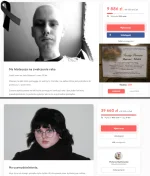Aktywne Wpisy

Fekalny_okuratnik +188
Przypominam, że żyjemy w świecie klaunów, w którym los mężczyzn jest gorszy od psiego gówna na ulicy.
#pieklomezczyzn #pieklokobiet #bekazlewactwa #przegryw #blackpill #redpill #logikarozowychpaskow #p0lka
#pieklomezczyzn #pieklokobiet #bekazlewactwa #przegryw #blackpill #redpill #logikarozowychpaskow #p0lka


giga_jablecznik +226
#rakcontent #bekazlewactwa #bekazfeministek
Jestem uciskana i nie mam zamiaru ci tego tłumaczyć, cis hetero białasie p0lski
Jestem uciskana i nie mam zamiaru ci tego tłumaczyć, cis hetero białasie p0lski






Im mniejszą dawkę "początkowa" wirusa dostaniemy podczas zarażenia tym więcej czasu organizm ma na przygotowanie się do obrony i lepiej go zwalcza.
Duży dawka wirusa przyjęta w krótkim czasie powoduje szybszy i gwałtowniejszy rozwój choroby.
To może wyjaśniać duże rozbieżności w statystykach przypadków bezobjawowych.
Idąc tokiem rozumowania z artykułu-obniżajcie stężenie wirusa jakie możecie wchłonąć
- nosząc maski,
- unikając pomieszczeń zamkniętych,
- wietrząc pomieszczenia zamknięte tak często jak to możliwe, zwłaszcza tam gdzie są tłumy(wesela) albo chorzy na izolacji domowej, w przedszkolach i szkołach też powinni o tym pamiętać
- w autobusie/tramwaju,pociągu a okna powinny być otwarte-niestety z klimatyzacji trzeba by zrezygnować
Artykuł ograniczony terytorialnie i z europy się go nie przeczyta. Polecam TOr albo jakiś VPN/proxy
https://fox6now.com/2020/07/25/mounting-evidence-shows-masks-may-help-avoid-severe-illness-even-if-you-get-covid-19/
Fragmenty
#koronawirus #medycyna #szkola #przedszkole #wesele
Komentarz usunięty przez autora
Zawsze mozesz próbować się umówić jako pierwszy pacjent.
Tak czy siak lepiej iśc teraz niż za kilka miesięcy.
Komentarz usunięty przez autora
Komentarz usunięty przez autora
@Pieniek1991: jak ty do takich wniosków doszedłeś.
Maski powinny być noszone. Zwłaszcza w pomieszczeniach zamkniętych, komunikacji miejskiej i wszędzie tam gdzie niemożna zachować odstępu.
Ponad połowa zarażeń pochodzi od ludzi, którzy nie JESZCZE nie mają objawów albo ich nie wykształcą nigdy. A łatwiej zatrzymać kropelki śliny zawierające wirusa na masce chorego niż po odparowaniu na
Komentarz usunięty przez autora
Komentarz usunięty przez autora
@ZapomnialWieprzJakProsiakiemByl: Dobrze, że na legalu nie noszę. ( ͡° ͜ʖ ͡°)
Więc moglibyście tym co nie noszą ze względu na stan zdrowia już
Przecież to jest HIPOTEZA jednej typiary, która dodatkowo poległa na odróżnieniu korelacji od przyczynowości xD
@gardan: przed pandemią jak miałeś grypę, albo byłeś chory na cokolwiek innego - też nie chodziłeś do lekarza? Mieszkasz sam? Czy osoby, z którymi mieszkasz też nie wychodziły w tym czasie z domu?
Komentarz usunięty przez autora
Komentarz usunięty przez autora